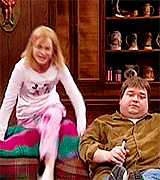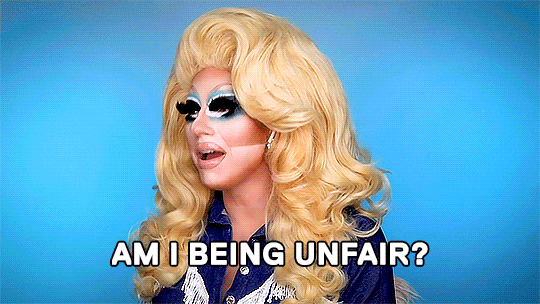How do I manage this ADHD child of mine?
Put on your shoe. Put on your other shoe. No, don't do that, put on your shoe.
I originally saw this question posed online a year or two ago and bookmarked it, before ADHD became a part of the conversation at my house, before my kids’ pediatrician said that he was witnessing basically an epidemic of ADD/ADHD diagnoses, before I got a handful of questions about the topic. So this is not a comprehensive ADHD issue and probably won’t be the last! Here’s the original question as posed:
“Witches with ADD or ADHD kids, talk to me. How the hell do I parent this child of mine? She does not have any formal diagnosis, but the fact that she gets distracted from putting on her shoes 6 times over in the span of walking 2.5 feet makes me suspect this all may be in our future. Yes, some of it is being 5.5, but I fear not all of it. Tips? Suggestions? Motivational tricks? Any words of advice greatly appreciated.”
Below are some answers I grabbed from that post, from friends I emailed, from witches raising ADHD kids I spoke with on the phone. Reading it made me personally feel better about having to spell out and closely supervise every single step of pajama-putting-on/face-washing/teeth-brushing process nightly for my child.
*
“Checklists help us because I can point instead of yell—although I still yell sometimes. Rewards for doing things quickly (praise, high fives, or even stickers on a chart). Only talk directly to the face, and make sure they are cued in to what you are saying. Say it once clearly when they are looking right at you, then walk away. Reward with praise (or stickers) when task is accomplished, say nothing and point to the checklist if it is not. My kid’s old therapist told us to aim for 85%. If we are decent parents 85% of the time, we are doing really well. I try to remember that when I lose my shit. Neurodivergent children are a freaking trip and sometimes I get jealous of other people who have ‘easy’ kids. But then I remember that no one’s life is simple and problem free. Even if they have compliant girls who color all day and don't require 72 checklists and constant boundary setting (I WILL NOT LET YOU HIT THE WALL WITH THAT BAT).
The other thing I might add to the list of advice is morning recess. This applies to bouncy kids who really need to get their heart rate up before they can settle down for school. It's really hard to squeeze in one more thing in the morning, but I have found that working towards 10 minutes of ‘recess’ before school really motivates my kids to hustle. We get everything done and ready to go, then I set a timer for 10 (ok 8) minutes and we play something--hide and seek, freeze dance, and in the warmer months, soccer or basketball. I could never have done it when I was working full time and had to be out the door by 7:30, but if you have any flexibility in your schedule, it can be a really great tool for the toolbox. I try to do it once or twice a week, if I can.”
*
“My son is now 10.5 and closing out 5th grade. We only sought a diagnosis this year because before that we were in the mindset of ‘what’s the benefit of a diagnosis/label?’ We didn’t want to medicate him and he’s energetic but not like bouncing off walls and disrupting class. He’s what I would call ‘small-h hyperactive’ and primarily the ‘inattentive’ type or just the ADD type of ADHD so he has mostly flown under the radar. No one, including teachers, has ever mentioned ADHD to me but I’ve always known something was up. When other kids in his class were getting medicated at 7, I was like ‘Every 7 year old is a little ADHD; what’s the big deal?’ But as he and his friends have gotten older the differences have become much more apparent to me. Other kids who were quasi-ADHD 7yr olds are now much more organized and mature 10-11yr olds and my kid still VERY much struggles with impulse control, attention with anything he’s not hyper-focused on, personal organization, losing EVERYTHING, tantrums etc. so we finally decided, after about two years of increasingly frustrating teacher conferences, that a diagnosis was primarily needed to change those conversations. Teachers were starting to label him as lazy, messy, not focused, rushing through work, too chatty, not organized, saying things like ‘by grade 5 we expect…’ and I just bristled at the one-size-fits all expectation. I could also see it starting to affect his self esteem. From my perspective, he’s doing GREAT if you stop comparing him to 90% of his classmates and just look at him on his own terms.
And honestly, that’s what’s worked best in terms of ‘raising this ADHD kid of mine’ is to stop comparing him to anyone else or expecting development on a certain trajectory or timeline. Meeting him where he is has changed everything. Lean into his interests and passions (which are numerous and often very brief) also making sure he gets a lot of exercise, like signing him up for sports with 1-2hr intense training sessions several times a week.
This is a long way of saying, I’ve tried pretty much every kind of system/rewards etc. for probably the past 8 years and none of it works. I find it all works great with my 3 year old non-ADHD kid, but the ADHD kid reeeealy suffers from what they call ‘time blindness’ and the only thing I’ve found that works is literally just spending the time to help him move through the morning and evening routines and any other transitions, providing what we call ‘constant supervision.’ I’ve given up expecting that he will move through routines on his own, remember what he needs, knuckle down at some task or chore given to him. He just can’t. He has every intention and just gets distracted and loses track of time midway though any one step, getting dressed, brushing teeth, unpacking backpack, cleaning his room etc. He needs as much assistance as a toddler and we just give it to him without judgement. It’s like when he was 4 and I tried to make cleanup a game. Now I break down tasks into super small digestible chunks and stay with him the whole time like, ‘Ok you put away all the books, and I will put away the papers, etc’ and I just stay there gently reminding.
Don’t get me wrong, this all makes me literally want to die and it’s exhausting and depressing as hell but he’s a lot happier and I think experiencing a lot less shame than he probably was when I was just yelling at him constantly because he only seemed to react if I made things into a GIANT EMERGENCY!!! but who wants to live like that.”
*
“My kid never responded positively to meds. Ever. What helped was limiting environmental distractions. One year, we had a new teacher that liked to play music, wear jingle bracelets, cover ever surface with inspirational posters, and use aromatherapy machines, and then wondered why my kid was so unfocused. Also, external rewards didn’t help. My kid needed help identifying systems that worked for them. Like lists. Clear steps. Fewer choices. Also, nature bathing. Kid is perfectly calm sitting in a tree, gathering wood, looking for beach glass, etc. The thing that really helped the ADHD a lot was 1) homeschooling and 2) time/maturity. I think what was successful about homeschooling was stripping down their environment/schedule and working in accordance with their schedule. Obviously, not replicable in a school environment completely, but still somewhat applicable.”
*
“My 9 year old is really good at getting one shoe on and then lying down to read a book. Honestly, my most successful morning tactic is Relentless Badgering. Or, if I'm feeling generous, ‘I’m going to play Old Town Road - can you get dressed including underwear, pants, shirt, and both socks (all of which I have just placed directly in your lap) by the time it’s done?’ Also a visual checklist can at times be helpful, but I feel like I have to keep referring him back to the checklist repeatedly sometimes.”
*
“I am not sure I have any kind of secret key to the ADHD thing, but it has for sure been easier when I notice the patterns my kid exhibits that are similar to my boss with ADHD. Her talking openly about it as a grown-ass lady has made it easier to deal with my kid. For both, presenting things I need as a nicely wrapped up package works really well. Equally well for the ‘I need to buy this software so I can do my work better because right now there is no undo button or auto save’ and the ‘I need you to do your own laundry if you actually want to play with me, because otherwise I need to spend my time cleaning up your shit and I can’t spend that time having fun with you.’ Clear action needed for logical and simple reason. I mean, obviously this is how communication should work, but too often I hedge with a ‘can you please help with…’ or ‘can we consider purchasing…’ and not just saying what I mean which is ‘fucking do it now and it will make everything better.’
*
“I don’t have first hand knowledge about the ADHD stuff but I have second hand rage texting knowledge because my friend's son was recently diagnosed with Pathological Demand Avoidance which is a type of autism that isn't widely diagnosed in the U.S. but is more recognized in the U.K. so lesson 1 is find good specialists followed closely by lesson 2: everything is ridiculous!
The other large lesson in dealing with schools she learned was to record and get everything in writing and she/we were all like ‘Oh ha ha ha that's so overboard.’ Fast forward 3 months when a second grader with an IEP is suspended for 10 days after a pencil throwing incident when the school had recently denied his psychologist's suggestion that he have a shadow and she’s like ‘Ok, so I get it now.’ There needs to be lots of meetings and discussions across the board (try to include or at least loop in art/library/music/pe teachers too at the end to help in those classes) to talk about strategies and rewards and what punishment would look like. And though it's tempting to delete the emails, keeping a written record of everything is very necessary (and communicating where you have something you can cite later).
Other advice she gave included helping children understand the fight/freeze/flight aspect of their brain and know that they can be triggered by things that are not deadly but still get that response so they need to identify the size of the problem and act accordingly; focus on what they are good at; give them a fast pass to tap out of things when they start to feel overwhelmed (but also building breaks into activities to preemptively help them from being overwhelmed). Specific to ADHD she said swimming and rock climbing were recommended because they are a whole body sport and especially the gentle resistance in swimming can be soothing. Also parents have to lower their expectations.”
*
“When we finally got my younger daughter medicated and diagnosed, it was night and day. She probably wasn’t properly diagnosed because she’s a girl. All the metrics for ADHD and autism are based on boys. I’ve been reading all these accounts of women in their 20s and 30s who are being diagnosed with ADHD and autism. They feel better. ‘I’m not weird; I’m not crazy.’ It took me a while to find a therapist who was open to that. She was diagnosed the summer before 2nd grade. Once that happened—some people cry. I was like ‘Finally.’
When they told me my older daughter was autistic, and I told my husband that, he cried. I was very clinical. I was more accepting of it. I’m in education. I’m in mental health. I’ve seen it all. I knew what the plan was. He was very academic, very achievement-oriented, valedictorian in high school; in those cases the parent might feel like the diagnosis is a reflection on you. That’s just parenting in general. That’s the kid that I got that I was given. My mom told me when I told her my daughter’s diagnosis, she said, ‘Well, be thankful. This is the child that you were given, and you are in the USA and you have resources. Back in the old country they would just be slapped all the time.’
I’m still learning with my younger daughter who is autistic and has ADHD, I have to be very explicit in my language. and in a tone that’s very matter of fact, not impatient. She’s very sensitive. Lately it’s been like, ‘Don’t forget a spoon.’ ‘Okay, okay!’
We have a binder, a checklist of everything she has to do—get up in the morning, change your clothes, brush your teeth, wash your face, eat breakfast, take medicine, put on your shoes. We got it to the point where we are like OK, if you do your whole checklist, for every day you do the checklist without us reminding you, you get a dollar at the end of the week. She’s not being rewarded every day. There’s an achievement but there’s still a goal there. It works. We’re getting to the point now, we have to reminder her, did you do your checklist? I was thinking about her wearing a watch and getting an alarm to put on it, or putting a picture in the house so every time she looks at the picture she’ll associated it with ‘Don’t forget to look at my binder checklist.’
I’m a little too soft and my husband’s a little too hard. The temptation is to give into the kids every time they don’t do something and that takes away from the discipline. They have to know they have a responsibility. Just because you have a condition doesn’t mean it excuses bad behavior. The rub is trying to figure out what is bad behavior.
At school, I have a meeting every year with her teacher. Before I do that, I spell out everything in an email. This is what she is, this is when she was diagnosed. These are the behaviors I have experienced this past year I’m working on. I warned them about certain things. At one point my daughter would just get up in class and twirl around and dance. ‘She’s twirling this year.’ I have meetings: it used to be I see them every trimester, now it’s a year, to get an assessment of what’s going on and everything. Since we’ve been adjusting since she was 4, we’ve gotten down to a science.
Investigate therapy. Don’t think you can handle this on your own. I started teaching in the ‘90s. I had a kid I feel bad about now and he was textbook. His mother refused to put him on medication. I think about him now, he was probably so miserable. Medication is OK. Parents say, “I hear all these bad things about it,” that’s fine, but can you research the good things that happen? Talk with people who have been on it. Look at Reddit. People are so scared of it. I understand, I cried the first time my daughter took a pill because I’m like, ‘I’m giving my kid amphetamines.’ But she feels better. Separate how you feel from the question of whether your kid will feel better.”
*
“Screen time is what keeps our house functioning. For the sake of family unity, if everybody’s got their own screen and couch to hang out on and people are not sniping at each other, we just have to do what we have to do. If my son eats separately sometimes or he’s watching a baseball game while the rest of us are having dinner. ‘I can’t be like why are we eating family dinner together?’
Personality wise, very little fazes me. If my son’s screaming about something, it’s not that he’s trying to be a dick, he can’t function and I get that. I can tell people how to interact with him. Here’s who he is, here’s show he operates, he’s not trying to be disrespectful if he’s he’s asking what time it is or what’s coming up. He needs to know if science will come before math. That’s from years of being his advocate. Whenever I say I need a teacher who takes him and ADHD seriously and know he’s not fucking around.
I’m super pro medication. Don’t come at it thinking you’re a failure. [As a person with diabetes], medication keeps me alive every day. If your kid needs a medication so their brain helps them be successful in this world, I don’t think it’s a bad thing. New meds come out; meds get discontinued. Stay on top of it. I never let that medication run out. I know what he’s like when he’s not on it.
It’s really good for the parent (typically the mom, I’d say) to be able to do their own thing without kid involvement. I sing in a choir so I’m able to get out of the house for one night and do my rehearsal and not have to think about my kid and his ADHD and anxiety for a night. It is really great for a parent who might end up doing all the life admin of ADHD (ordering the meds, coordinating the doc/provider visits, talking to the kid after school about whatever happened that day, etc) to have something that is just for themselves. It’s gotten easier to do this as kids have gotten older, but it’s so great to have something at any point. There’s no guilt or shame in taking care of your own mental health as the parent of a kid with ADHD.”
End credits
Thanks for reading Evil Witches, an unsponsored newsletter for people who happen to be mothers. Feel free forward this issue to someone who might find this helpful. If you haven’t yet, I hope you consider becoming a paid subscriber which gets you bonus content, threads, and sneak previews of upcoming topics. Moreover it pays for the reporting and so-called editing you see herein! Some favorite subscriber-only threads and posts lately include alone food and strategies on enjoying a trip with your family.
If you have any questions, feedback, or suggestions for the newsletter you can reply to this email or talk to other witches on Twitter. The archives live here. A few recent ones I think turned out pretty well, in case you missed them, included talking with empty nest role models, the truth about what it takes to be a working mom and a published author, and the daily timeline of parenthood favorability.








While this article didn't deal with the social issues of ADHD, I think that might be worth a future article. We had several situations that the school acted quickly and appropriately around bullying, but some times you just had to suck it up and move forward.
Love that we get to talk about this in this space and really value the conversation. As a parent of a child with ADHD (as a piece of a global developmental disability) and as a therapist I wanted to say 2 things
1- it’s been a very stressful 2 years for all of us and kids are no exception so if your kid’s symptoms got “worse” remember this great way of looking at it that one of my colleagues said “anxiety is a bird looking for a branch to land on”. In other words helping kids bring general stress level down and expecting it to take a few stable months before they return to their baseline. For all kids (not just ones with ADHD) the best way to bring stress level down is through predictability, consistency, and routines. For our kids and their parents (happy parents=happy kids)
2 we try to use the language “kid with adhd” vs “adhd kid” because the former makes it something a person deals with vs labeling the person as the issue. Although it’s ok to be a little messy here and I love that about this forum so mess away but wanted to mention it in case it is helpful for anyone.
Love to my fellow witches and happy Thursday 💀